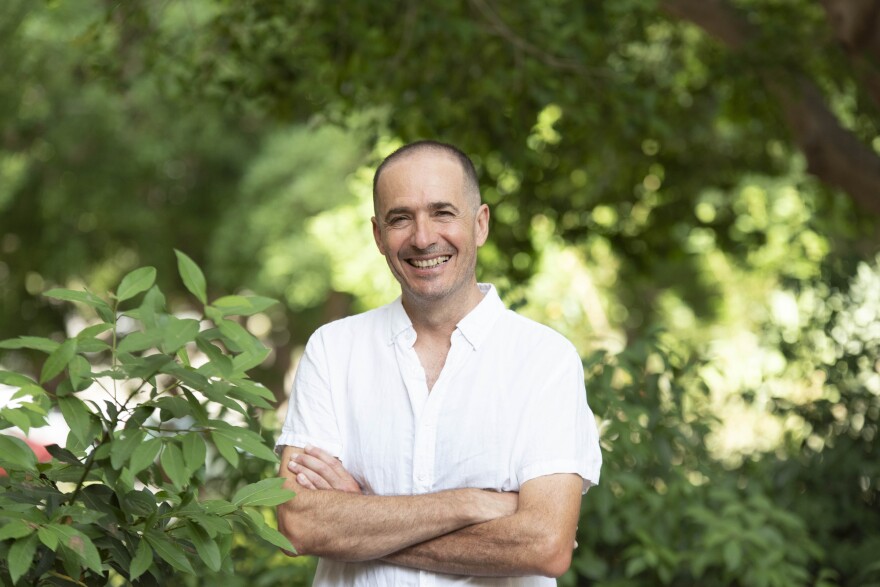We haven’t been giving the Plant Kingdom enough credit. Plants can move, attack, communicate, and adapt — even though they don’t have what's normally defined as a brain.
So are plants intelligent? That’s the question Paco Calvo and Natalie Lawrence explore in their book “Planta Sapiens: Unmasking Plant Intelligence.”
Plants may not have brains, but they still exhibit behaviors that some scientists interpret as “plant intelligence.”
Like the walking palm tree, which can rot off parts of its roots and grow new roots in a desired direction. If it’s feeling too crowded or needs to avoid swampy terrain, the palm can walk up to 3 cm a day!
Or the tomato plant that can defend itself by releasing a molecule that makes caterpillars turn into cannibals and destroy themselves, instead of the tomato leaves.
Researchers are even considering the possibility of plants communicating with each other through sounds that are too high-frequency for humans to hear.
But does this mean plants are intelligent? Intelligence can mean different things in organisms, but one definition is “the ability to learn from experience, and to adapt to, shape, and select environments.”
Paco Calvo, author of the book “Planta Sapiens,” thinks the answer is yes, plants are intelligent.

“We have many examples. You can train strawberries to associate low-light or high-light with nutrient patches,” says Calvo, who is also the director of the Minimal Intelligence Lab at the University of Murcia in Spain.
A plant will typically grow toward light, away from gravity, and in the direction of water. But they can be taught otherwise: Scientists can train pea plants to change what directions they grow towards, based on the position of blue light or a fan.
Calvo says he wrote “Planta Sapiens” with Dr. Natalie Lawrence to educate people not only on plant intelligence, but also about “plant blindness.”
There are 435,000 different types of plants on Earth, but a study out of North Dakota suggests that humans tend to look right past them. When shown multiple pictures of random objects, students ignored all the target images of the plants and focused instead on pictures of animals or water.
Lawrence says that blindness is partly to blame for our misunderstanding of the Plant Kingdom. “You don't need to pay so much attention to something that's not going to eat you, do you?” says Lawrence.
(Don’t miss our previous Seeking A Scientist episode: Do Fungi Secretly Rule Our World?)

Lawrence has her Ph.D. in the history and philosophy of science. She says the fact that plants have survived so long on Earth demonstrates an ability to apply knowledge and skill, another interpretation of “intelligence.”
“And then you realize that we are all on the same page,” Calvo says. “That, after all, we humans are doing the same thing that bacteria, fungi, or plants are doing.”
The concept of plant intelligence isn’t without its critics. In an interview with the New Yorker, University of California’s plant physiologist Lincoln Taiz argued that “plant neurobiologists suffer from over-interpretation of data, teleology, anthropomorphizing, philosophizing, and wild speculations.” He thinks researchers are desensitizing plants during these elaborate experiments, and that Paco and his colleagues are misinterpreting the reactions as “learning.”
Both Calvo and Lawrence welcome the skepticism, though, saying that their work is to find out the boundaries of what’s possible.
“Paco is primarily a philosopher of science who is trying to think outside the box and to expand our conceptions of how life works,” Lawrence says. “He's not making any firm claims. It's just there's a possibility here and we need to work out how we can properly get at it experimentally.”
Listen to the latest episode of the KCUR Studios podcast Seeking a Scientist to find out more.
Additional sources from Seeking A Scientist:
- Plant Based Diet
- 20 Prettiest Flowers in the World
- Dragon Arum Temperature Changes
- Tropical Pitcher Plants
- Zilker Botanical Garden
- Environmental Factors Affecting Plant Growth
- Plant Sentience: Time Scale Matters
- Charles Darwin: History’s Most Famous Biologist
- On the Movement and Habits of Climbing Plants by Charles Darwin
- Spontaneous Revolutions, Darwin’s Diagrams of Plant Movements
- Interplant Communication
- The Mimosa Plant
- Plant Anticipatory Behavior
- The Mystery of Why Sunflowers Turn to Follow the Sun – Solved
- Tree of Life
- The Elements
- The Legacy of Humoral Medicine
- Distance to Mars
- Plant Inspired Robots That Could Colonize Mars
Seeking A Scientist is a production of KCUR Studios. It's made possible with support from the Stowers Institute for Medical Research, where scientists work to accelerate our understanding of human health and disease.
It's hosted by Dr. Kate Biberdorf, AKA Kate the Chemist. Our senior producer is Suzanne Hogan. Our editor is Mackenzie Martin. Our digital editor is Gabe Rosenberg.
This episode was mixed by Suzanne Hogan with support from David McKeel, Byron Love and Genevieve DesMarteau.
Our original theme music is by The Coma Calling. Additional music from Blue Dot Sessions.













